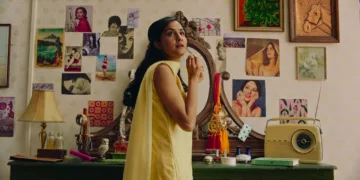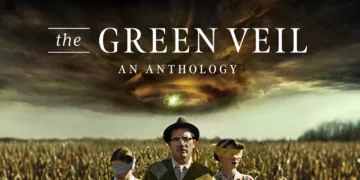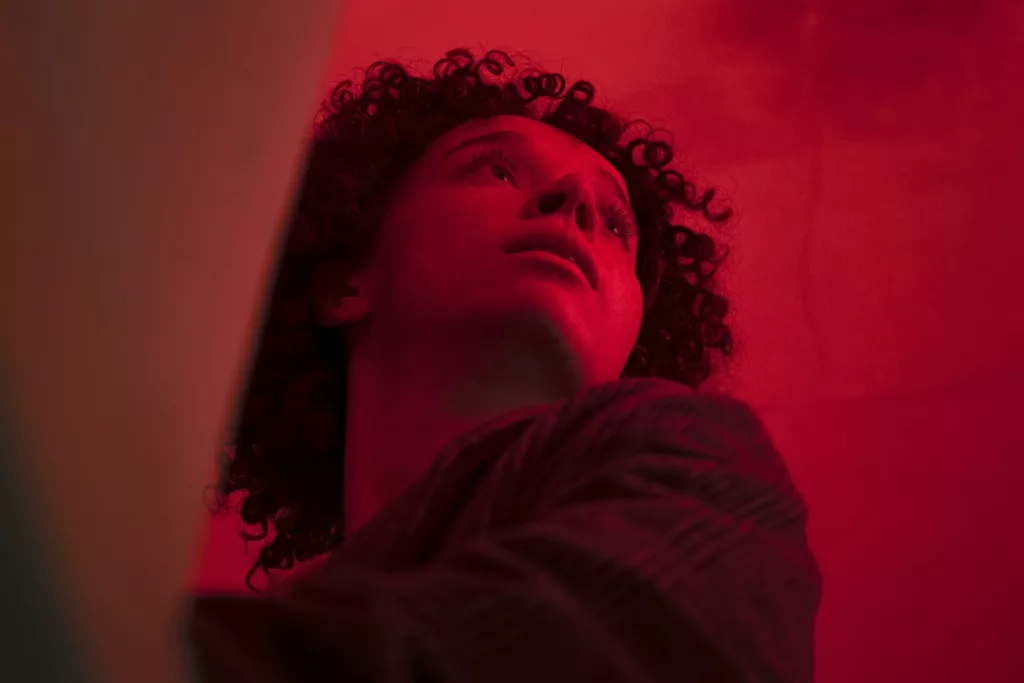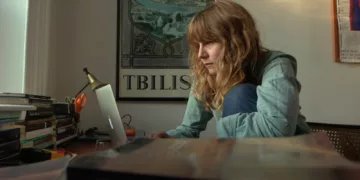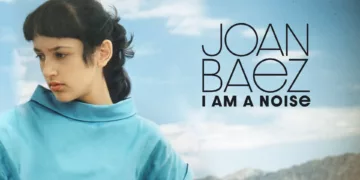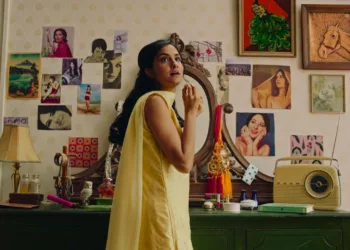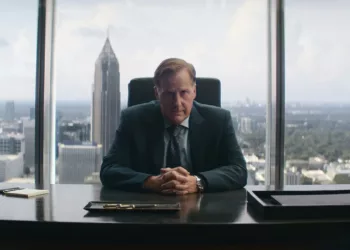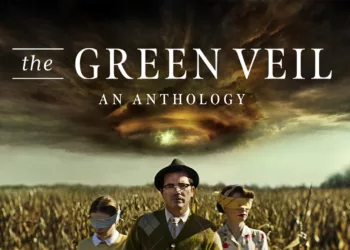Woken opens with the cinematic equivalent of a bucket of ice water dashed squarely in the viewer’s face. We’re thrust into a frenzied chase, panic etched into the wild eyes of the fleeing Erin Kellyman as the terrified Anna. Her protruding belly a visceral reminder of her sheltered cargo, she hurtles towards the cliff’s unforgiving edge in a desperate bid for…what exactly? Escape from an unseen terror? Or release from afflictions more existential?
With pulse-pounding recklessness, she flings herself bodily over the precipice, plummeting into the gnashing waves below. This jarring prelude leaves us disoriented and gasping alongside her. Just as we struggle to make sense of this literal cliff-hanger’s stakes, the deliberate rug-pull jolts us into another startling reality.
Anna awakens from her nightmare plunge, but the locus of her torment proves no more grounded. A remote stone cottage, flickering by candlelight like a spectral mirage. Enter Maxine Peake’s Helen and Ivanno Jeremiah as the perplexingly reassuring James – strangers claiming familiarity as her very husband and neighbor. Has trauma robbed her memories, or are more pernicious forces altering her perception of reality?
With this disquieting set-up, writer/director Alan Friel swiftly ensnares us in Anna’s escalating delirium. The audience is left as muddled and suspicious as the protagonist about who or what to trust. An atmospheric descent into neo-Gothic dread mere moments in, Woken cunningly indoctrinates us into its ominous artifice from the outset.
Descent into Delirious Distrust
In the beguiling opening act, Woken artfully lays its Hitchcockian foundations of paranoia and dread. But as the intrigue proliferates, so too does Anna’s distrust in those around her – a skewed perspective we inhabit with unsettling intimacy.
Clues about the island’s sinister secrets are teased out like ominous breadcrumbs. A menacing swan pedalo drifting into view. Rooms brimming with identical hand-knitted baby garments, their cheery yellow hues now seeming vaguely threatening. The cacophony of cracking crab shells during meals becomes a percussive portent of Anna’s fraying nerves.
Director Friel wields these innocuous details like a cinematic gaslighter, compelling us to skeptically question every reassuring gesture from Helen and James. Their overt concern for Anna’s wellbeing morphs into something more manipulative through her (and our) distrustful lens.
The stark, windswept Irish exteriors become forbidding stages for this psychological gamesman. Richard Kendrick’s camerawork immerses us in the remote, untamed setting’s primordial hostility as thoroughly as the haunting sound design. The ominous lashing of waves against the craggy shores underscores a looming threat simmering beneath Woken’s deceptively placid veneer.
At the throbbing center, Erin Kellyman is utterly compelling as the fraught, fretful Anna. Her expressive visage charts a cathartic arc from confusion to simmering suspicion to white-knuckled determination to escape her baffling purgatory. As the increasingly enigmatic neighbor Helen, Maxine Peake balances flinty relentlessness with furrowed compassion in masterful contradistinction to Kellyman’s rising desperation.
Their gripping tete-a-tetes together are riveting game of mental cat-and-mouse, each scene calcifying our allegiance to the manifestly gaslit Anna. We’re madeana active accomplice in her escalating delirium about what horrors may lurk beneath this island’s bucolic facade. A steadily intensifying through-line of dread courses through Friel’s taut unspooling mystery.
Depths of Desolation and Despair
Beneath its suspenseful storytelling and escalating dread, Woken plumbs the existential depths of human isolation, shattered trust, and the resilience of our species.
On its deceptively idyllic island stage, the film charts Anna’s entrapping descent into a waking solipsistic nightmare. As her tenuous bonds with supposed loved ones James and Helen fray, her desperate attempt to anchor herself against unraveling reality becomes a poignant metaphor for the fragility of human connection itself.
In the hothouse environment of Anna’s torment, doubts about even her own bodily autonomy blossom into terrifying possibility. The seeds of gynecological horror sprout from this febrile soil of uncertainty about whether her burgeoning pregnancy is mere delusion or a cruelly-imposed subjugation.
This queasy melding of psychological thriller and futuristic horror tropes forces us to confront disquieting questions. In a world teetering between perseverance and extinction, do the ends of ensuring humanity’s perpetuation justify any means, no matter how unethical or inhumane? Can we preserve our cherished morality and still endure?
With its potent meditations on the extremes to which individuals might go to survive, Woken poses thorny ethical predicaments without presupposing tidy resolutions. Anna’s predicament becomes a harrowing thought experiment about the sanctity of selfhood and Enlightenment ideals of bodily freedom when the paradigms shifted so catastrophically.
By leaving audiences to ponder these ambiguities rather than delivering didactic reassurances, Friel’s increasingly bleak psychological roller-coaster forces a reckoning. In the face of planetary calamity and civilizational collapse, where do we draw the line between moral necessity and unconscionable violations? Woken prods us to interrogate these discomfiting conundrums through Anna’s harrowing subjugation.
Stark Visuals, Haunting Soundscapes
For a modestly budgeted indie production, Woken showcases an impressive technical aptitude in its haunting visuals and soundscape craftsmanship.
Cinematographer Richard Kendrick makes inspired use of the film’s rugged Irish shooting locations in Counties Clare and Limerick. The windswept exteriors battered by turbulent seas exude an austere, foreboding beauty perfectly complementing Anna’s isolating ordeal. Friel capitalizes on these elemental textures to amplify the pervasive sense of dread and desolation.
Within the dim, candle-flickering interiors of the forlorn cottage setting, Kendrick’s camerawork cultivates an exquisite dankness evocative of the damp chill seeping into Anna’s bones. As misery and mistrust encroach from all sides, the stone walls become as stifling as any maximum security prison.
While not breaking major stylistic ground, Woken’s visuals conjure an admirably enveloping atmosphere of elemental hostility despite limited resources. The starkness amplifies dread more assuredly than any flashy bravura camerawork could.
Complementing the spartan yet affecting imagery is the film’s wise embrace of aural minimalism in its sound design. With soundtrack stingers employed judiciously, the ambient textures become the predominant audio palette – from the incessant sighing whispers of the wind to the droning thrums of crashing waves.
This understated sonic milieu not only augments the pervading loneliness, but allows seemingly anodyne noises like crabshell clacking to take on escalating ominousness as Anna’s mental state frays. The muffled, sepulchral acoustics within the cottage’s confines become another metaphorical prison closing in inexorably.
For its economical scale, Woken demonstrates an admirable technical acumen in marshaling its visual and sonic capabilities towards engendering potent atmospheric dread. With rigorous discipline over its restricted means, the film maximizes unnerving impact.
Unsettling Payoffs and Timely Disquiet
After steadily escalating the narrative tension to nearly unbearable degrees, Woken’s ultimate reveal of the island’s dark raison d’etre lands with appropriately disquieting impact. The gradual pulling back of the curtain on this ostensible paradise’s true purpose proves as thematically rich as it is deeply unsettling.
Without delving into spoiler territory, the unveiling recontextualizes Anna’s predicament and society’s desperation in confronting an existential crisis several degrees more dire than even initial intimations suggested. What began as an intimate psychological character study spirals outward to grapple with much broader apocalyptic themes about the human drive for self-preservation at any cost.
While not every narrative detour entirely coheres, Friel should be commended for his ambitious swing at exploring such weighty, morally murky subject matter. The storyline’s climactic descent into full-tilt genre turmoil poses thorny philosophical quandaries without resorting to reductive didacticism.
In Anna’s increasingly nightmarish saga, we’re compelled to scrutinize where ethical boundaries should be drawn between the greater good and individual liberty when the stakes are pushed to such extremes. As madness and reason blur, Friel prods us to interrogate to what unspeakable ends we might be driven in the interest of self-preservation.
These potent inquiries into the ends justifying any means underpin Woken’s bleak, difficult to shake relevance and contemporary resonance. At a time when ecological collapse and democratic backsliding loom as existential threats, the film confronts our species’ capacity for moral fraying and draconian measures with chilling allegorical puissance.
It presents a vision of desperate path we could stumble down if collective self-interest and cold pragmatism fully displace more empathetic, equitable values. While far from perfect as a psychological chiller, Woken certainly leaves viewers with much to ponder about unsettling potential futures if we remain incurious to history’s darkest chapters.
In the end, this gripping rumination on the lines we might cross in extremis lingers like a bitter yet compelling aftertaste. Even as Woken stumbles in smoothly sticking the narrative landing, the disquieting preoccupations it provokes are well worth wrestling with.
Flawed Yet Fascinating Folk Horror
For all its ambition in grappling with heady themes of societal collapse and the limits of moral compromise, Woken can’t quite maintain a perfect cohesion between its arthouse psychological thriller pretenses and more bombastic genre swings. The tonal ricochets grow increasingly erratic as the film lurches towards its unnerving final act revelations.
And yet, as a calling card for writer/director Alan Friel’s talents and artistic audacity, this fledgling effort leaves an indelible, haunting impression. The potent atmospherics and gripping central performances from Erin Kellyman and Maxine Peake cast a lingering unshakable spell. Even when the narrative ante gets upped past its breaking point, Friel’s deft cultivation of dread and menace exerts a disquieting hold.
For the hardy genre enthusiast with arthouse sensibilities, Woken skulks in an intriguing eerie interzone. Its overarching exploration of human perseverance in the face of civilizational ruin poses thorny philosophical queries amidst moments of discomfiting body horror. While its reach occasionally exceeds its grasp, this bold low-budget folk horror still casts a spellbinding shadow.
For the intellectual thrill-seeker endlessly fascinated by cinema’s dark tributaries, I’d urge you to let Woken draw you under its consumingly moody surface. Just be prepared for some murkier detours past the point of no return from which you may emerge more disoriented than edified. An auspicious if imperfect first feature, this twisted island folk tale will leave you obsessively dissecting its murky appendages and grotesque imagery long after its closing credits abruptly splashed you back ashore.
The Review
Woken
A flawed yet fascinating descent into disquieting folk horror depths, skillfully mining dread before somewhat scrambling the existential themes it so tantalizingly introduces. For the brave soul seeking an atmospheric head-trip bristling with bleak potentials, Woken should thoroughly... well, woke you from complacency.
PROS
- Gripping atmospheric buildup of dread and paranoia
- Strong central performances from Erin Kellyman and Maxine Peake
- Haunting visuals and skilled use of rugged Irish locations
- Ambitious exploration of weighty themes like morality in extremis
- Effective minimalist sound design amplifying a sense of isolation
CONS
- Narrative loses some cohesion in the convoluted final act
- Tonal shifts between psychological thriller and horror become jarring
- Some of the broader apocalyptic concepts aren't fully fleshed out
- A few plot points and character motivations remain murky
- Can't quite stick the landing on its philosophical provocations

